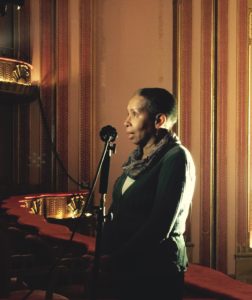In January Regan Burke and I were on WGN Radio 720 touting the benefits of memoir-writing with Justin Kaufmann, host of The Download. Last month 81-year-old writer Bob Eisenberg shared some of his Chicago stories on The Download, and now it’s Audrey Mitchell’s turn.

Ttune in to WGN Radio 720 at 9 pm to hear Audrey Mitchell on WGN Radio 720.
Audrey is another writer whose stories intertwine with mine in my latest book, Writing Out Loud. The 500-word essays she reads aloud in class give us all a better understanding of the Great Migration — her parents came to Chicago from Edgefield County, South Carolina.
Before signing up for my class at the Chicago Cultural Center, Audrey had spent hours at her computer tracking down genealogical information about her family. After even more time at the South Carolina Archives, the Old Edgefield District Genealogical Society, the Great Lakes Regional Archives, and Chicago’s Newberry Library, Audrey ended up with pages of names, dates, and addresses.
But no stories.
All her family stories were oral. None of them were written. But Audrey has changed that. She has written down the stories her parents shared with her and has contacted — and visited — her relatives in South Carolina to get their stories down, too.
Once it was decided that Audrey would be one of the writers we’d feature in Writing Out Loud, I took her out for coffee, brought my digital recorder (I told her it was running!) and enjoyed a couple of magical hours listening to her answer some lingering questions about her life story. Here’s an excerpt from Writing Out Loud where I mention that coffee date: Chapter 68, Why Audrey Stays in Chicago.
Audrey can tell how intrigued I am by all her research. Over a cup of coffee at a local coffee shop, she tells me more of what she’s learned.
The 1870 Census was the first U.S. census to list all persons, including former slaves, as individuals. “I don’t have their slave records, but I do know my great-grandparents lived in Edgefield County in 1870,” she says, reasoning that they’d stayed there after the Emancipation Proclamation. “I have oral history and written data to back that up, but what I’m missing is the voice of my older relatives, what they were thinking, what they were feeling and like that. That’s why I keep taking your class. So my stories don’t get lost like theirs are.”
She then reveals that she’s pretty sure she’s figured out who owned her great-grandparents as slaves.
I’ve heard this genealogy stuff can get addictive, but does she really want to know who the slave owners are? Audrey doesn’t skip a beat. “Oh, yeah!” she says.
I drum up the courage to ask an even more awkward question: Why?
Her answer is obvious.
“Most people do want to know who the slave owners were,” she says. “In most cases, they’re an ancestor, too.”
Audrey’s essay “Why I Have Not Moved to South Carolina” is excerpted in Chapter 68, too, and on The Download this Wednesday she’ll be talking with Justin Kaufmann about her decision to start leading her own memoir-writing class at the Wrightwood-Ashburn Branch of the Chicago Public Library in her southwest side neighborhood of Chicago. Mark your calendars now and tune in to Wgn Radio on Wednesday, April 11, 2018 at 9 pm.
Audrey is a gem!
Another ‘goose bump’ story coming up. It takes courage to dig into a painful past… and Audrey really is a very strong woman. Yeah, Audrey!!!
I’m so pleased that Audrey, and others, are getting this recognition. It is so important to capture their memories and the history they are sharing. Way to go!
Thanks, Laura. I have you to thank for encouraging me to work with WGN Radio 720 in the first place –this regular time slot with The Download is more than I ever dreamed of. And you are so right, the writers –and their stories — need to be heard. Hoping our regular appearances with Justin Kaufmann will motivate listeners to start getting their own stories down on paper, or to start leading a class like ours in their own communities.
Audrey’s story sounds very interesting. And it made me think of Mom.
My mom is working with an Elder of the Church of Latter Day Saints in Salt Lake City. They have one of the most comprehensive collections of genealogy.
Ancestry.com started out with an agreement to use this collection.
We have had the easy part for a long time, but the search gets more challenging before 1903 or so when one side of her family immigrated from Eastern Europe.
Leave a Response